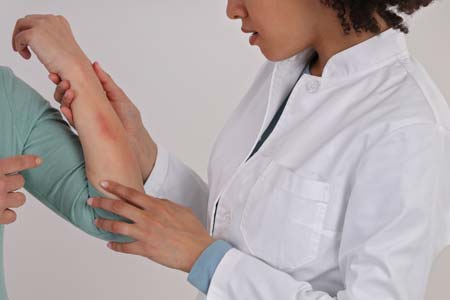Acne & Eczema
Acne
Acne (zits, pimples spots) can cause discomfort and embarrassment and affects most people at some point during their lives. About 4 out of every 5 people experience acne outbreaks between the ages of 11 and 30.
What Causes Acne?
Acne starts in the skin's oil glands. The hair on our bodies comes out through canals from these glands called follicles. Oil glands make oils that emerge to the skin's surface through the follicles' openings, or pores, along with the hairs.
Sometimes hair, oil, and dead skin cells come together to plug a follicle. The plugged pore provides the right conditions for bacteria that normally live on the skin to thrive. When the body's immune system attacks the bacteria, pain and swelling can result. That's how a pimple forms.
Increases in certain hormones can cause oil glands to get bigger and make more oil. These hormone levels go up during puberty. Because of this increase, acne is most common in adolescents and young adults.
Treatment & Prevention
People with acne should avoid skin products that contain petrolatum, a type of oil. Look for creams and lotions labeled "noncomedogenic" which are less likely to clog pores.
While there are plenty of home remedies for acne, it's better to start with proven over-the-counter treatments for mild acne. These products can contain benzoyl peroxide, resorcinol, salicylic acid, or sulfur.
People with severe acne should discuss prescription drug options with a doctor. These include antibiotics to kill bacteria or drugs called retinoids, which can be given as a topical to apply to the skin or as an oral medication.

Eczema
What is Eczema?
Eczema is a term for several different types of skin swelling. Eczema is also called dermatitis. Most types cause dry, itchy skin and rashes on the face, inside the elbows and behind the knees, and on the hands and feet. Scratching the skin can cause it to turn red, and to swell and itch even more.
Eczema is not contagious. The cause of eczema is unknown. It is likely caused by both genetic and environmental factors. Eczema may get better or worse over time, but it is often a long-lasting disease. People who have it may also develop hay fever and asthma.
The most common type of eczema is atopic dermatitis. It is most common in babies and children, but adults can have it too. As children who have atopic dermatitis grow older, this problem may get better or go away. But sometimes the skin may stay dry and get irritated easily.
Treatment for Eczema
Treatments may include medicines, skin creams, light therapy, and good skin care. You can prevent some types of eczema by avoiding
- Things that irritate your skin, such as certain soaps, fabrics, and lotions
- Stress
- Things you are allergic to, such as food, pollen, and animals

